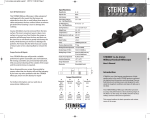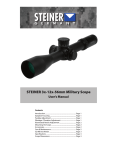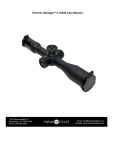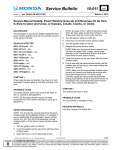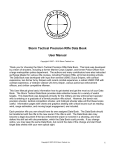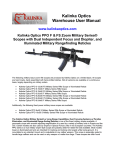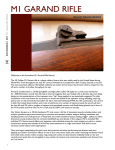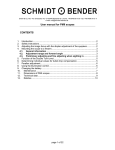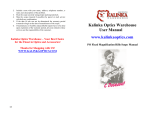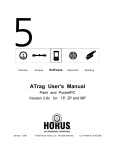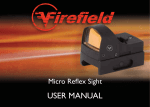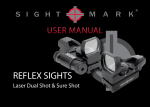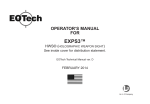Download Premier Reticle Heritage 3
Transcript
Heritage™ 3-15 X 50 User Guide American Company… American Product The Premier Heritage™ 3-15X50 carries a lifetime warranty. If you have any questions or would like more information regarding your scope please contact us using the information below. For a more comprehensive user manual, one can be downloaded from our website. Caution: Ensure all manufacturer instructions are followed when mounting this optic to a rifle in order to prevent damage to the optic, rifle, and/or operator. Also do not look through the optic directly at the sun or laser light devices as doing so could result in permanent eye injury. 175 Commonwealth Ct. Winchester, VA 22602 USA Phone: 540-868-2044 Email: [email protected] Website: www.premierreticles.com Specifications: Length: 13.6” Height: 3.09” Width: 3.98” Weight: 38 oz Click Value: 0.1 mrad / .36” @ 100 yards Elevation Range: 22 mrad/ 76 MOA Total Elevation Range: 34 mrad/ 117 MOA Windage Range: 16 mrad/ 55 MOA Diopter Range: -3 to +2.5 Exit Pupil: 11.5mm-3.5mm Eye Relief: 3.5” Field of View: 12.8 m to 2.8 m Gen II Mil Dot™ Reticle: The Gen II Mildot™ reticle is installed in the first focal allowing range estimation and trajectory compensation to be performed at any magnification level. The click values match the reticle meaning that ten clicks of the elevation or windage knob will equal one mil at any distance. This can greatly reduce the time necessary to make corrections for zeroing or target engagement, as the correction noted while looking through the scope is the correction that needs to be dialed in. Below are some subtensions of the Gen II reticle. (Not To Scale) 0.4 mil 1.0 mil 0.2 mil 0.5 mil 0.8 mil 5.0 mil Operation: 2. Adjust Diopter: 1. Loosen the ocular lock ring by turning it counter clockwise. 2. Look through the scope and adjust the ocular until the reticle comes into focus. 3. Look away and look back at the reticle to ensure the image is still crisp and clear from edge to edge. 4. Tighten the ocular lock ring by turning it clockwise until snug. The diopter will only focus the reticle to the eye. Adjust Magnification: 1. To increase magnification, rotate the power adjustment ring counter clockwise. 2. To decrease magnification, rotate the power adjustment ring clockwise. Illumination: 1. Grasp the knob and pull away from the scope to enable the illumination function. 2. Rotate the knob clockwise and select one of the eleven intensity settings. The illumination will shut off between intensity settings however the barrel cannot be pushed back in. 3. To turn off the illumination rotate the knob counter clockwise until the knob hits the stop and then push the illumination knob back in. Elevation/Windage Knob Operation: The elevation and windage knobs are single turn with 0.1 mrad clicks and a noticeable “clunk” every full mil. The elevation knob also has a zero stop approximately .5 mil below “0”. Elevation: 1. To increase elevation adjustment, rotate the elevation knob counter clockwise. 2. To decrease elevation adjustment, rotate the elevation knob clockwise Windage: 1. For right windage, rotate the knob counter clockwise. 2. For left windage, rotate the knob clockwise. Zeroing out the knobs: 1. Use a cartridge case or other object to lift the toggle on top of the elevation and windage knobs. 2. Flip the toggle 180* so the toggle is upside down. 3. 4. Changing the battery: 1. Use a coin or similar object to insert into the slot on the battery cover. 2. Rotate counter clockwise until the cover can be removed to expose the battery. 3. Remove the battery and replace with a fresh CR2032 coin cell battery. 4. Replace the battery cover and rotate clockwise until snug. Parallax Adjustment: The scope can compensate for parallax from 50 meters to infinity. Adjust Parallax: 1. To adjust the parallax for farther objects rotate the knob clockwise until the target and reticle are in focus. To adjust the parallax for closer objects rotate the knob clockwise until the target and reticle are in focus. Grasp the knob and reset it to zero. While turning the knob it will still have audible clicks and clunks however there will be no change in zero. Once the knob is reset to zero, return the toggle to the upright position. The toggle will be in the optimal position when steady pressure is needed to fully close it. If the toggle is not in the optimal position then the toggle will not close or it will require excessive pressure to close. If excessive pressure is necessary to close the toggle, lift it and th turn counter clockwise 1/16 of a turn, then retry. Too little pressure on the toggle can result in the toggle becoming loose while turning the knob, which can result in no correction being made despite audible clicks and clunks. Lens Cleaning: 1. Use a soft brush to remove dirt and dust from the lens. 2. Use a lens pen or an optical quality solution to clean the lens using a spiral motion starting at the center and going out. 3. Remove any left over residue or streaks from the glass using a lens pen or piece of lens paper.


